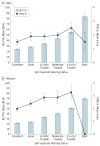Hearing impairment associated with depression in US adults, National Health and Nutrition Examination Survey 2005-2010
- PMID: 24604103
- PMCID: PMC4102382
- DOI: 10.1001/jamaoto.2014.42
Hearing impairment associated with depression in US adults, National Health and Nutrition Examination Survey 2005-2010
Abstract
Importance: Depression among hearing impaired US adults has not been studied previously.
Objective: To estimate the prevalence of and risk factors for depression among adults with hearing loss.
Design, setting, and participants: Adults aged 18 years or older (N = 18 318) who participated in the National Health and Nutrition Examination Survey (NHANES), 2005-2010, a nationally representative sample.
Interventions: Multistage probability sampling of US population.
Main outcomes and measures: Depression, assessed by the 9-item Patient Health Questionnaire (PHQ-9) scale, and hearing impairment (HI), assessed by self-report and audiometric examination for adults aged 70 years or older.
Results: The prevalence of moderate to severe depression (PHQ-9 score, ≥10) was 4.9% for individuals reporting excellent hearing, 7.1% for those with good hearing, and 11.4% for participants who reported a little trouble or greater HI. Using excellent hearing as the reference, after adjusting for all covariates, multivariate odds ratios (ORs) for depression were 1.4 (95% CI, 1.1-1.8) for good hearing, 1.7 (1.3-2.2) for a little trouble, 2.4 (1.7-3.2) for moderate trouble, 1.5 (0.9-2.6) for a lot of trouble, and 0.6 (0.1-2.6) for deaf. Moderate HI (defined by better ear pure-tone average of hearing thresholds at 0.5, 1, 2, and 4 kHz within the range 35- to 49-dB hearing level) was significantly associated with depression among older women (OR, 3.9; 95% CI, 1.3-11.3), after adjusting for age, sex, race/ethnicity, lifestyle characteristics, and selected health conditions.
Conclusions and relevance: After accounting for health conditions and other factors, including trouble seeing, self-reported HI and audiometrically determined HI were significantly associated with depression, particularly in women. Health care professionals should be aware of an increased risk for depression among adults with hearing loss.
Conflict of interest statement
Figures



References
-
- World Health Organization. The Global Burden of Disease: 2004 Update. Geneva, Switzerland: World Health Organization; 2008.
-
- Blazer DG. Depression in late life: review and commentary. J Gerontol A Biol Sci Med Sci. 2003;58(3):249–265. - PubMed
-
- Hogan A, O’Loughlin K, Miller P, Kendig H. The health impact of a hearing disability on older people in Australia. J Aging Health. 2009;21(8):1098–1111. - PubMed
-
- Cacciatore F, Napoli C, Abete P, Marciano E, Triassi M, Rengo F. Quality of life determinants and hearing function in an elderly population: Osservatorio Geriatrico Campano Study Group. Gerontology. 1999;45(6):323–328. - PubMed
-
- Capella-McDonnall ME. The effects of single and dual sensory loss on symptoms of depression in the elderly. Int J Geriatr Psychiatry. 2005;20(9):855–861. - PubMed
Publication types
MeSH terms
Grants and funding
LinkOut - more resources
Full Text Sources
Other Literature Sources
Medical
Miscellaneous

